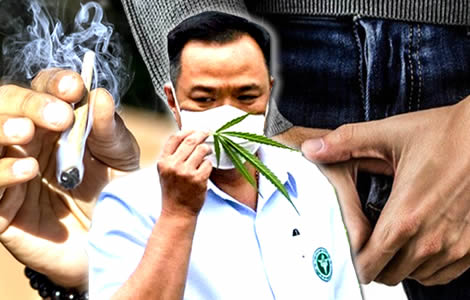Original plans to deregulate cannabis, this year, were for it to be made freely available only for medical use and products with a strictly limited THC (tetrahydrocannabinol) value. This week, as authorities moved to pull back on the deregulation free for all while new legislative provisions that would make recreational use of cannabis illegal, are stalled, for now, in parliament, there are new concerns about its use in food products and on restaurant menus as its harmful effects are being highlighted.
Amid rising evidence being put forward by Thai medical experts and authorities that cannabis, even in moderate quantities, can seriously harm not only younger people with developing brains both physically and mentally, is a story this week, detailed in a case report within a highly respected medical journal, of a 23-year-old Thai man who cut off his sexual organ with scissors after ingesting 2 grams of cannabis through a bong. The man had developed what is thought to have been a painful priapism or extended erection while also suffering from psychosis caused by the drug. The shocking case, reported last January, was accompanied by medical supporting information and photographs suggesting that the incident was not a once-off and that cannabis may have the peculiar ability to induce priapism without sexual stimulation. The news comes with growing calls to again make recreational use of cannabis illegal in Thailand as the minister moved last week to regulate and restrict its use and a recent National Institute of Development Administration (NIDA) survey showed over 72% of Thai people are worried about its harmful effects with 42.22% extremely worried even though a majority of people still support its deregulation on a commercial basis to benefit struggling farmers and for medical purposes.

On Wednesday, the Forensic Physician Association of Thailand (FPAT) became the latest medical health body to come out firmly against the recreational use of cannabis or marijuana by the public.
Health benefits of cannabis for epileptic children and those seeking palliative treatment for cancer accepted by top Ministry of Public Health official
Last week, the Director-general of the Department of Medical Services, Dr Somsak Akksilpm, a supporter of his minister’s campaign to deregulate the use of cannabis for medical purposes, strongly warned that the drug posed a risk to adults who used it for recreational purposes and to children or adults aged under 25 with firm evidence suggesting that the drug impairs brain function and development among younger people.
Concern rising about the devastating effects of cannabis due to its toxicity and cardiovascular effects
Concerns have been rising since four men were admitted to Bangkok hospitals last week suffering, according to doctors treating the patients, from an ‘overdose’ of cannabis with one dead and another being treated in intensive care.
One dead from a cannabis overdose with 4 admitted to hospital sparking growing anxiety in Bangkok
On Wednesday, Dr Smith Srisont of the Faculty of Medicine at Ramathibodi Hospital, the President of the Forensic Physician Association of Thailand (FPAT) referred to voluminous research in the United States that suggests that the drug is harmful also on a broader basis both to the physical and most particularly mental health of all adults.
Dr Smith gave an example of 13 people who died from cannabis in a study who, according to blood tests, did not consume large quantities of the drug and who were aged from 17 to 52 years of age.
US study in 2019 among 4,000 people shows that cannabis kills and raises the risk of heart disease as well as adverse mental health effects
It was also found that they had consumed no other toxic substances nor did they have any underlying ill-health issues.
The same study also found that 35 people in the same age group had developed illness after using cannabis even moderately leaving them suffering from heart disease and cardiac arrhythmia.
The 2019 study of 4,000 people quoted by the top medic also showed that patients who used cannabis were 4.8 times more likely to contract ischemic heart disease caused by narrowed arteries if they smoke the drug for approximately one hour each day.
Indeed, many of the adverse effects of the drug have been linked to its vascular effects on the body.
0.8% of poisonous incidents across the US linked with cannabis use including ingestion and inhalation
In the same year, the American Association of Poison Control Centres reported that cannabis, as a substance, accounted for 0.8% of all deaths in the United States from toxins or poisoning.
A report in the same year by the Oregon and Alaska Poison Centres found that 73.9% of incidents involving cannabis poisoning involved ingestion of the substance with 22.5% caused by inhalation and several other modes of application from data compiled from 2015 to 2017.
The research found that the average THC (tetrahydrocannabinol) strength found in cannabis being used for recreational purposes in the United States ranged from 4% to 12%, far higher than the 0.2% limit set by Thailand’s current law related to cannabis extracts and which has been interpreted as not applying to parts of cannabis plants used by recreational users to smoke ganja or weed.
Direct link between THC (tetrahydrocannabinol) levels in cannabis and adverse impacts on health
The research in the United States established a direct relationship between the THC (tetrahydrocannabinol) content levels and its adverse effects on members of the public.
Scientists established that recreational users of cannabis were smoking the drug to take advantage of psychoactive effects achieved through the dopamine pathways in the body.
On Tuesday, the Thai Department of Mental Health confirmed the shocking reported case of the 23-year-old Thai man whose case was examined by a study in a reputable medical journal this January.
Thai man who amputated his sexual organ after taking 2 grams of cannabis through a bong
He had cut off his penis after developing what medical experts diagnosed as a case of priapism, or enlargement of the male sex organ without sexual stimulation after taking cannabis.
The horror story experienced by the man came after he recommenced using cannabis by smoking two bongs or 2 grams of marijuana after suspended use of the drug for 3 months having previously been a cannabis or ganja user for 2 years.
The news and case study relating to the twenty-three-old comes as Thailand’s Ministry of Public Health moved last Thursday to again regulate cannabis when Minister Anutin Charnvirakul signed an order restricting its use by people aged up to 20 years old unless under medical supervision again restricting the use of the drug as a controlled substance.
The substance was also banned for use by pregnant women and those who have recently given birth.
A separate order issued by the Department of Thai Traditional and Alternative Medicine outlawed the use of cannabis in public spaces such as department stores, near schools or state agencies.
Backlash begins against the full legalisation of cannabis for recreational and widespread use even though a majority of Thais agree with deregulation
The backlash against the fullscale legalisation of the drug which is effectively what has happened without a corresponding law proposed by the government in January to outlaw cannabis for recreational purposes by controlling the use of key parts of the plant, such as the leaves and buds, has given away to rising public concern despite there being a majority in support of the deregulation move based on the promised commercial gain for Thailand’s struggling farmers and its acknowledged medical benefits to sick people.
A National Institute of Development Administration (NIDA) poll released on Sunday showed 58.55% supported the move to deregulate but an even more significant number, over 72%, told researchers that they were worried about the danger posed by the drug to the public.
Significantly, 42.22% of people polled including adults in all socioeconomic groups throughout the country expressed themselves as very worried about the potentially harmful effects of the drug on members of the public with 29.62% somewhat worried.
10% of the public smoke marijuana for recreational purposes in Thailand, 7% for medical purposes
The same survey showed that only 10% of people smoked marijuana for recreational purposes which senior officials with the Narcotics Control Board (NCB) said last week was intended to be maintained as an illegal activity according to the deregulation proposals outlined by the government in January, when the plans to delist cannabis was were approved by the cabinet and actioned by the Ministry of Public Health Anutin Charnvirakul, through proposed corresponding legislation in parliament.
It was found that twice as many people or 20% have now used cannabis in food or food products with nearly 7% using it for medical purposes.
The poll showed that the vast majority of the Thai public, 67.02%, have absolutely no experience with the drug with the other 32.98% being those who used it for recreational purposes, medical purposes, in food or those involved in the production and distribution of the substance.
New law promised to effectively control recreational use in January after deregulation as nightmare Thai marijuana story confirmed by a medical journal
At the end of January, Deputy Prime Minister and the government’s legal advisor Wissanu Krea-ngam suggested that the new law would help control the use of cannabis and be used as the means to make sure Thailand honours its commitments under international treaties signed by the kingdom to strictly control the substance from 1961 to 1988.
Cannabis remains illegal as ministers push through a law controlling its use by the public after decriminalisation
The nightmare story and review of the case of the young man who cut off his penis were published in January in the Journal of Medical Case Reports in an article prepared and contributed to by four medical professionals which examined the nature of the incident and the effect of cannabis on a broader basis causing mental disorders and other cases where those who have used the substance have also cut off their penis.
The medical paper stated that cannabis has been used widely around the world on both an illegal and legal basis for medical and recreational purposes.
It did not deny the therapeutic effects of the drug on ill people but also pointed to adverse effects which are widespread and accepted by the medical and scientific community.
Psychosis linked with cannabis impairs judgement
One key adverse effect of even limited but regular use of cannabis is psychosis which leads to significantly impaired judgement and potential among some people to self-harm
The analysis of the case involving the young Thai man involved contributions from his primary care physician, an emergency physician or trauma specialist, a urologist and a psychiatrist involved in the disturbing case.
The young man had recommenced using cannabis after abstaining for three months and consumed 2 gm of the substance using a bong.
Within two hours he began to experience an erection which quickly became painful.
Doctors say that the man had not consumed any other intoxicants but did admit that he was consuming five cups of coffee per day when the incident occurred.
Patient denied using alcohol or any other intoxicants but did consume five cups of coffee on a daily basis
In particular, the patient, when he presented at hospital, denied any alcohol consumption or that he was suffering from depression.
He told doctors he used no other substance nor did he have a previous history of psychiatric treatment and that this was also the case for his extended family.
He also explained that the erection that developed two hours after consuming the cannabis then became excruciating with sharp bursts of pain. He recalled that his sexual organ appeared distorted and swollen.
He disclosed to medics that, at that point, he was not hallucinatory but in a misjudged attempt to release himself from the agonising pain, he began what he thought was an effort to trim the foreskin from his sexual organ.
Man deranged by excruciating pain of a priapism
This urge led him eventually to amputate his penis to relieve the painful sensation with scissors leaving behind a 2 cm base, pictures of which were posted with the accompanying report but which cannot be reproduced due to community and publishing standards.
He went to the hospital after approximately two hours when the bleeding from his wounds would not stop.
On arrival at the hospital, he was administered intravenous cloxacillin and tetanus prophylaxis before being transferred to the emergency department for more intensive care and intervention.
Case notes from doctors who treated the man said he was co-operative after being admitted and appeared hemodynamically stable meaning his blood flow was not erratic.
However, the man was suffering from heavy bleeding from his sexual organ including a 5cm lacerated wound to his scrotum.
Body parts extremely damaged and contaminated by dirt and ants, doctors ruled out reconstructive surgery
Doctors identified that the body part was extremely damaged and contaminated with dirt and ants. Any prospects of reconstruction were ruled out as an emergency operation was prepared.
The 23-year-old was interviewed by a psychiatrist who diagnosed a psychotic disorder caused by an intoxicating substance.
There was also concern about the negative effects on the man’s life caused by the self-inflicted damage including the loss of urinary and sexual functions which were bound to have a devastating psychological effect.
Further mental health evaluation of the man discovered that he was suffering from auditory and visual hallucinations including noticing the movement of dark shapes, hearing a buzzing sound of insects and birds chirping while also suffering from depression.
Thai man diagnosed as both coherent and delusional
The diagnosis was that the patient in the case was both coherent and at the same time, delusional. He was also found not to have suicidal thoughts despite the self-harm inflicted on his body.
After surgery, the man recovered in hospital for 14 days and was given psychotherapy treatment as well as the drug risperidone, used to treat schizophrenia and bipolar disorders.
He was treated for a further two weeks as an outpatient and plans were made to have further surgery on his genital area before he disappeared or relocated.
The dosage of the drugs while in care was increased gradually from 2 mg per day to 6 mg before he was discharged from hospital.
When discharged, the man was able to go to the toilet and void in a sitting position without any danger of further infection to his wounds.
Traces of THC (tetrahydrocannabinol) found in the man’s urine samples up to four weeks after the horrific incident as similar cases are identified
Doctors found traces of cannabis of THC (tetrahydrocannabinol) in the man’s urine samples within 4 weeks of being admitted to hospital and being off the drug since then.
In the medical reports, doctors noted that the Thai man was not formally diagnosed with priapism or extended erection for four hours since the man had cut off his sexual organs after two hours of intense pain.
The medical paper discussed other cases where patients had been recorded as experiencing the same condition caused by priapism induced by cannabis in a patient who had been smoking the drug for six months but who did not suffer from psychosis and was given hospital treatment including the application of ice to the genital area and the injection of gel to induce a deflation of the sexual organ successfully.
Another case highlighted where a man committed the same self-harm under the influence of cannabis
In another recorded case, a patient ingested cannabis and developed priapism while also suffering from psychosis. He chopped off his penis with a sharp object.
Doctors in the study put forward the theory that cannabis can cause erections without sexual stimulation through dopamine receptors but in a counter effect, a block in the thoracolumbar sympathetic pathway causes the penis to be unable to detumescence or ease its swelling thus causing the patient to experience priapism.
In the case of sufferers who amputate their sexual organs due to extreme pain related to the condition, doctors are also unsure whether the pain is caused by the swelling or aroused state or some effect also contributed to by the effects of cannabis on the vascular system of the body.
Join the Thai News forum, follow Thai Examiner on Facebook here
Receive all our stories as they come out on Telegram here
Follow Thai Examiner here
Further reading:
Marijuana revolution and overdoses raise concern with calls for action to outlaw recreational use
Legal pot does not appear to be working for Anutin’s Bhumjaithai Party in latest opinion poll
One of the biggest drug dealers in the South flees home as Thai police and army move against him
Thai man burns down his family home: Thailand’s drugs problem is still a very real threat to society
UK man arrested on drugs charges by CSD police in Pattaya claims ex Thai wife set him up
UK drug dealers living it up in Thailand to be deported back to the UK after arrests in Pattaya
Italian living with Thai wife on Koh Phangan arrested for dealing after drugs found in the post
UK drug dealers living it up in Thailand to be deported back to the UK after arrests in Pattaya
Kiwi taken into custody on drug charges in Chiang Mai after police raided his bar and restaurant
Double life of a UK man who became a drug dealer in Udon Thani
UK man watched his ceiling as a downpour of money spelled his downfall and jailing in Thailand


















